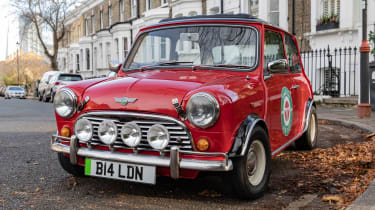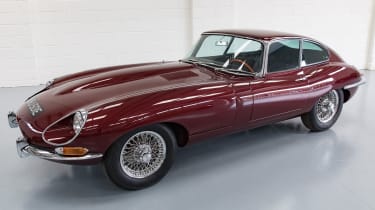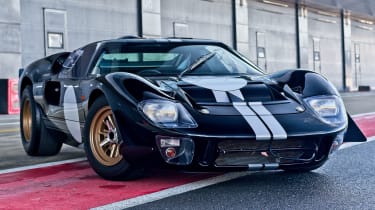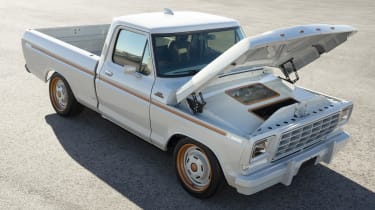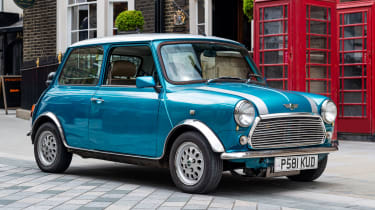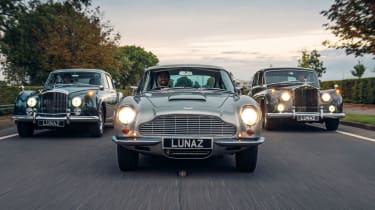Electric classic cars: costs, companies and conversions
We take a look at what it takes to convert a classic car to electric power, as well as some of the best examples produced to date

The popularity and demand for electric classic cars have grown rapidly in recent years as enthusiasts look for a way to continue enjoying their beloved older vehicles without having to worry about future taxes, low or zero-emission zones or other government regulations forcing them off the road.
There are now a whole host of companies specialising in bespoke conversions of a wide range of classic cars, with electric motor and battery configurations to suit the owner's wants and needs. But some manufacturers have also commissioned their own conversions of classic models from their past to electric power, often using drivetrain components from their latest brand-new zero-emissions models.
In many cases, the electric car conversions carried out by these companies will be reversible. On top of preserving as much of the original car as possible, it also means the car’s current and future owners will have the option of reinstalling the original powertrain later down the line, should they so wish.
How much does it cost to convert my classic car to electric?
According to specialist conversion company Electric Classic Cars (profiled below), the cost of a conversion can vary: it says a small car with a sub-100-mile range might cost around £30,000 to convert, whereas a large SUV with a 200-mile range might cost as much as £100,000. That includes all parts and labour needed to complete the job. Of course other companies can charge close to half a million pounds or more for one of their creations.
Carrying out your own conversion will be cheaper, but it's not a task for the amateur DIY mechanic: you need extensive knowledge of electrical and automotive engineering to do the job properly and safely. There's also a mountain of paperwork to wade through to get the converted car certified as road-legal and registered. For these reasons, we recommend using a specialist instead of undertaking the work yourself.
What do I need to convert my car to electric?
You need more than a battery pack and electric motor to create a fully functional electric car. Thankfully conversion kits will provide you with the other vital components you'll require, including grommets, crimps, an adaptor plate, motor mount, coupler and battery boxes, plus the battery and motor itself.
If you're converting a car to electric yourself, price for these kits vary from a few thousand pounds for a basic one and into six figure territory for more elaborate setups, however, with a growing number of companies offering these kits, the choice available is expanding.
But if you're after a turnkey conversion built by the pros, here we take a look at some of the outfits building and converting electric classic cars, which range from the original manufacturers themselves to smaller specialist firms.
Aston Martin
Aston Martin has developed its own in-house electric conversion programme for its classic models. In late 2018, it converted a DB6 Volante as a showcase for what can be done, based around the concept of a 'cassette' drivetrain. The electric motor and batteries are designed to be almost the same size and weight as the car's original petrol engine and gearbox, as well as delivering near-identical performance characteristics. Much of the technology used was developed for the (now-cancelled) Aston Martin Rapide E project. The conversion is carried out in such a way that it can be reversed at a later date if this is wanted.
Charge Cars
Charge Cars' (www.charge.cars) pure-electric reimagining of the 1967 Ford Mustang Fastback isn't your typical conversion. The London-based company creates a brand new car using a steel body shell and lightweight composite panels, then fits all-new hardware from its technology partner Arrival. That includes a 64kWh battery, which is enough for a 200-mile range, and four electric motors that combined produce 536bhp and 1,500Nm of torque. The result is 0-62mph in 3.9 seconds and all-wheel-drive.

The Electric Mustang by Charge Cars also gets rapid charging up to 50kW and a redesigned cabin with digital driver's display and large central infotainment touchscreen. Just 499 examples will be built, with various options and accessories for buyers to choose from, making each one completely bespoke. You can reserve one now, but prices start from £350,000 for the hand-built, zero-emissions muscle car.
Electrogenic
In recent years, Electrogenic (www.electrogenic.co.uk) has been converting numerous classic cars to electric power from its Oxford base. That includes zero-emissions versions of the classic Mini hatchback, 10 of which will join London driving tour operator smallcarBIGCITY’s fleet. They're powered by one of the company's ‘Hyper9’ electric motors, but performance is restricted to provide a driving experience more akin to that of the original 51bhp petrol engine. Range is between 80 and 100 miles thanks to a 21kWh battery.
Regular customers ordering a Mini conversion from Electrogenic don’t need to have the same performance restrictions: larger battery options that can provide twice as much range are available. Electrogenic also offers a trio of conversion packages for the Jaguar E-Type. They're dubbed ‘Tourer’, ‘Sprint’ and ‘Grand Tourer’ and all leave the bodywork and interior of the E-Type untouched. The first two also use the original gearbox, however, the top-of-the-range Grand Tourer package includes a single-speed unit to cope with the 369bhp and 600Nm of torque Electrogenic packs into the E-Type.
E-Types with the Tourer and Sprint conversion packages have a 150-mile range, but Electrogenic will offer “one or two” range extenders to customers that'll each add around 50 miles to the maximum range. Meanwhile, Grand Tourer E-Types will be capable of up to 250 miles with the range extenders.
Electrogenic has also created a drop in conversion kit for old Land Rover Defenders, aimed at working vehicles and the agricultural sector. The kit includes a single electric motor that produces 120bhp and 235 Nm of torque, which is powered by a 52kWh battery pack that gets mounted under the bonnet. According to Electrogenic, converted Defenders offer roughly 100 miles' range, while the Defender's original all-wheel-drive is preserved, so there's no loss in off-road capability.
The company is known for its one-off classic-car conversions, too, like a 1971 Citroen DS, 1976 Triumph Stag and a 1957 Morgan 4/4, as well as zero-emissions of a Porsche 356, Series 2 Land Rover, Rolls Royce Silver Shadow and Volkswagen Beetle.
Electric Classic Cars
Electric Classic Cars (www.electricclassiccars.co.uk) is one of the more established UK companies carrying out electric classic-car conversions. It's run by Richard Morgan and features in a Quest channel TV series called 'Vintage Voltage', showcasing some of the conversions carried out. Past projects have included electric conversions of a Porsche 911, a Karmann Ghia, a Fiat 500, a Land Rover Defender 110, a Chesil Speedster, a BMW 2002, a Ferrari 308 GTS and a Lancia Fulvia.
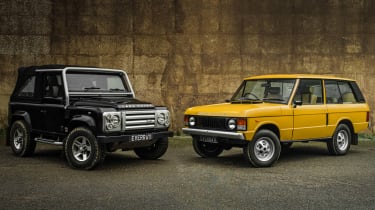
Everrati
Set up by entrepreneur Justin Lunny, Everrati (www.everrati.com) focuses on "upgrading glamorous vehicles from the past with electric powertrains and a compassionate makeover". Everrati's flagship model is a 500bhp Porsche 964 that features the Oxfordshire-based company's 'Signature' widebody kit. It's capable of 0-62mph in less than four seconds, starts at £270,000 and there's even a convertible version now.
In December 2022, the company announced its programme for fully restoring and enhancing classic Range Rovers and Land Rover Defenders with EV powertrains (pictured above). Each car can be completely tailored to a customer’s desires, and the conversation to electric power is reversible should any owner want to return it to stock form. Prices for Everrati's Range Rover Classic start at £230,000 plus VAT and the donor vehicle, while a Land Rover Defender will be £185,000, plus VAT and donor vehicle
Everatti has also created a zero-emissions version of the iconic Ford GT40, developed with the help of continuation specialist Superformance. It produces 800bhp and 800Nm of torque from a pair of electric motors, all of which is sent to the rear wheels. The GT40 EV is capable of 0-62mph in well under four seconds, while an 700-volt electrical architecture allows for 80kW rapid charging. According to Everrati, the electric GT40 can cover up to 125 miles thanks to a 60kWh battery.
If you want the driving experience to be more like the original Le Mans-winning GT40, Everatti has fitted its zero-emissions replica with two speakers that can deliver up to 110 decibels of simulated V8 exhaust sound when in 'Race Mode'. You can also use the gear shifter to switch 'virtual gears', which delivers a brief pause in the V8 soundtrack and torque delivery.
Ford
At the 2021 SEMA show in Las Vegas, Ford showed off its 'F-100 Eluminator' concept (above). The one-off build showcases the fact that Ford now sells the electric traction motor from its Mustang Mach-E electric SUV in 'crate' from to enthusiasts and companies, for fitting to classic or custom vehicles. In the long run the company hopes to offer an entire 'turnkey' solution for carrying out aftermarket electric conversion, including motors, batteries, inverters and control systems.
London Electric Cars
London Electric Cars (www.londonelectriccars.com) says it wants to prove that "conversions don’t have to cost the earth". For £35,000 before taxes and the cost of the donor car, the 20kWh-battery LEC-converted classic Mini is capable of 60-70 miles on a charge. However, customers can request more power, upgraded batteries for increased range and rapid-charging capability.
LEC is offering its conversion package for all classic Minis. Under the retro bodywork, instead of using a brand-new powertrain, the company fits the electric motor and battery cells from a pre-owned Nissan Leaf. It says this is a more sustainable approach, reducing the need for additional mining of raw materials to build a fresh powertrain.
Founded in 2017 and based in Vauxhall, London Electric Cars has also developed zero-emissions versions of other iconic British models, including the Land Rover Defender and Morris Minor. It's also working on converting a Bentley T2, a Lincoln Continental Convertible and a Ford Anglia.
Lunaz
Founded in 2018 by David Lorenz and based close to the Silverstone circuit in Northamptonshire, Lunaz Design (www.lunaz.design) employs over 100 engineers, restoration specialists and craftspeople, some of whom have worked at Aston Martin, Bentley, Ferrari, Jaguar, Land Rover, McLaren Rolls-Royce and in Formula 1.
Lunaz has created high-end conversions of exclusive classic cars such as the Jaguar XK120, Rolls-Royce Phantom V, Rolls-Royce Silver Cloud and Bentley Continental. All its cars are engineered with fast-charging capability, regenerative braking systems and integrated modern technology such as traction control and cruise control. Customers can also specify bespoke, handcrafted interior finishes and upholstery.
Among the company’s creations are a limited initial run of 50 electric Range Rovers, each of which receives a ground-up restoration and boasts four-wheel drive, uprated suspension and improved brakes. Two specifications are offered – Town and Country – along with a choice of two wheelbase lengths and a host of bespoke options; prices starting at £245,000 before taxes. In October 2021, Lunaz announced a limited run of electric Aston Martin DB6s. Prices start from over $1 million (£730,000), with Lunaz also accepting applications from potential customers for a run of zero-emissions DB4s and DB5s.
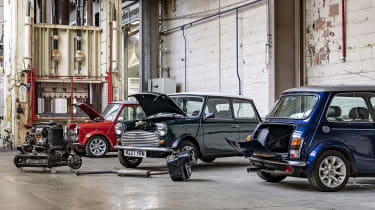
MINI Recharged
Back in 2018, a one-off zero-emissions classic Mini conversion carried out by the brand itself appeared at the New York Motor Show. Encouraged by the positive response to that car, MINI has now developed a 'Recharged' conversion package for its iconic supermini that it'll soon offer to owners.
It involves replacing the four-cylinder petrol engine and gearbox with a battery pack and 121bhp electric motor, which makes these cars more powerful than any original production version of the Mini. The result is 0-62mph in roughly nine seconds and a 100-mile range.
The changes made are reversible, with the original running gear being stored by MINI in case owners decide to revert to petrol power in the future. Prices for a Mini Recharged conversion start from £39,950 if you already have the donor vehicle, or from £57,500 if you decide to use a MINI-provided car.
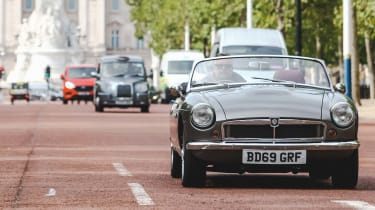
RBW
British company RBW (www.rbwevcars.com) got off the ground in 2020, and plans to build brand-new electric sports cars using fresh MGB body shells and manufacturer-standard electric drivetrains and bodies. It was founded by David Swain and draws on the engineering expertise of automotive component manufacturer Continental.
The EV Roadster's 34.5kWh battery back is the same as that used in the Nissan Leaf, and sits under the bonnet in the space occupied by the engine in a regular MGB. The electric drivetrain, meanwhile, is mounted in a frame that fits within the rear bodywork without the need to cut any metal. RBW hopes to sell up to 30 EV Roadsters in 2021, and you can read our full feature and first drive of the car here.
As well as the Roadster, RBW also builds hard-top GT and more visually-authentic Retro versions of its new-build MGBs. In addition, there’s also its ‘E to EV Type’ programme – rather than being a brand-new electric Jaguar E-Type, this is instead a conversion of an existing car – and, like many other classic car conversions, it’s fully reversible if you ever want to put the petrol powertrain back in.
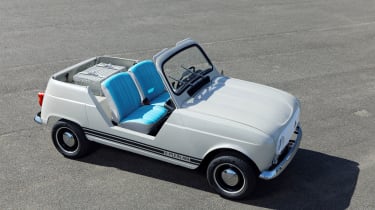
Renault
Back in 2019, Renault experimented with an open-top electric concept car based on its classic Renault 4 family hatchback. Called the 'e-Plein Air' (above), it's a nod to the Renault 4 Plein Air beach car of the 1960s. The powertrain and battery are from a Renault Twizy, giving the car 17bhp and a range of about 60 miles. Inside, the seats have been reupholstered in eye-catching blue, while a picnic hamper features in the rear.
Fast forward a few years, and now Renault has teamed up with a French company called R-Fit for a range of electric conversion kits for classic Renaults. A package for the Renault 4 is already available, and similar kits for the original Renault 5 and the Mk1 Renault Twingo are on the way. You’ll need to cross the Channel to have an R-Fit kit on your older Renault, though; for now, the installation work can only be carried out at authorised centres in France.
Swind E Classic
The Swind E Classic is an original Mini that has been converted to electric power by British outfit Swindon Powertrain (www.swindonpowertrain.com). The company developed its own electric motor (which it will sell you in 'crate' form for £8,325 plus VAT) for the project. Priced from £79,000, the E Classic comes with a 24kWh battery, a driving range of around 120 miles and a charge time of four hours from a 7kW home wallbox charger.
For now, the Swind E Classic is the only converted car you can buy directly from Swindon Powertrain, but the company has been involved in other electric classic car programmes. For example, it supplies the electric motor tech used in Hemmels’ Mercedes SL Pagoda conversion, and it developed the powertrain for Aston Workshop’s electric Aston Martin DB5 and DB6 projects.
Twisted
Yorkshire Land Rover Defender tuning company Twisted (www.twistedautomotive.com) now offers pure-electric conversion packages for the beloved British off-roader. It's available for all Defender body styles, including the four-door 110 and even larger 130. Underneath the square-jawed bodywork of the two-door Defender 90 in the video above is a bespoke electric drivetrain, made up of a 61kWh battery pack feeding a single electric motor, producing 268bhp and 1200Nm of torque.
Range for the electrified Defender 90 stands at 140 miles, but Defender 110s will get a 180-mile estimated range thanks to a larger 81kWh battery. Both figures are more likely in the car’s Eco mode rather than Sport, which you can switch between while on the move.
However, even though it's greener than before, the Twisted Defender hasn’t lost any off-road capability: power goes to all four wheels through a traditional transfer case and the car has retained the choice of high and low ranges. Plus, the Twisted EV Defender gets a 900mm wading depth.
Prices for the Twisted EV Defender starting from £225,000 plus VAT. The conversion takes around two weeks to complete, and is carried out at either Twisted’s facility in Bristol, UK, or Virginia, North Carolina in the US. If a ready-made EV Defender is beyond your budget, Twisted also offers conversions for existing Defenders, with prices starting from £89,000 before tax.
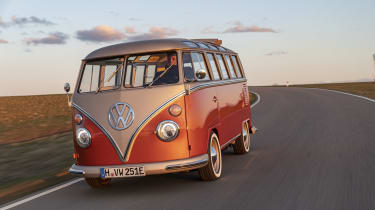
Volkswagen
Volkswagen has created several electric versions of some of its most popular models by adapting the drivetrains of its modern electric-car models. The e-Bulli (above) is a classic VW camper van with the internals of the Volkswagen e-Golf electric hatchback, built to showcase the company's 'eClassics' division in Germany, which has been set up to convert classic VWs of all types to zero-emissions power. The division has also produced a convertible e-Beetle with the drivetrain of an e-up! to further demonstrate what it can do.
Most Popular

Morgan Super3 XP-1 is an electric three-wheeler

MINI Cooper Electric: pricing and specs for British-built electric supermini

